- Home
- Adam Cesare
Clown in a Cornfield Page 3
Clown in a Cornfield Read online
Page 3
The lawn wasn’t the totality of the view, though.
Their property abutted a cornfield. Miles and acres of the crop. Which shouldn’t have surprised Quinn. She’d seen the house on Google Maps. The whole town was encircled by corn.
Quinn looked to the horizon as the cornstalks swayed with the breeze. The corn itself could have been waving hello, or it could have been breathing. Missouri itself a sleeping giant under their new home. Enormous, indifferent. The thought could have been comforting or she could let the idea freak her out, that she was living on the back of a monster named Missouri. It was all a matter of how she chose to look at it. Perspective.
Quinn peered out into the distance. The corn wasn’t all she could see. Out in the fields, breaking the horizon, looming above all like a warning, was a large, dilapidated warehouse and factory. Even small on the horizon, she guessed the structure was five stories tall, not including the chimney stack tilting out the back. The factory’s roof was sagging like an animal with a broken back.
On the side of the building was what looked like a mural. There were plenty of murals in Philadelphia, a whole municipal department dedicated to them, and maybe this would be a nice reminder of home. The mural needed a wash, though; it had been blackened and sooted-over by whatever calamity had ruined the building in the first place.
She took out her phone, unlocked to the camera, and used the digital zoom to get a closer look.
There, painted on the side of the factory, was a clown.
An old-timey clown with a porkpie hat and red, bulbous nose. The clown had faded greasepaint stubble on his chin, and his once ruby-red nose was pocked with blisters from where the paint had bubbled. His painted white face had long gone gray. But his eyes had been more or less untouched by the flames, and something in the way they’d been painted made it seem like the clown was staring straight into her window, straight at Quinn.
Across the top of the factory building was the word “Baypen.” It must have been the name of the company, but Quinn felt no strong desire to research it.
And under the clown was a slogan that was illegible but for the word “EVERYTHING” written in all caps and a looping, fake-fancy scrawl. Quinn snapped a picture of the clown. Maybe she’d send it to Tessa later. Her friend liked creepy stuff, would get a kick out of it. She’d make Quinn feel better about having a pervert clown watching over her. And then she’d tell Quinn what Quinn already knew: that her next task was to find some damn curtains for that window.
Two
Quinn woke to a phone alarm she didn’t remember setting.
She flopped onto her back and blinked for a second at the unfamiliar ceiling, then looked over to the poster that’d come loose overnight and was hanging limply by three corners; the new desk; the boxes still to unpack . . .
Nope. She hadn’t imagined Kettle Springs.
There was a knock on her door, the sudden noise shoring up Quinn’s consciousness.
“I made breakfast,” her dad said. A pause. “It’s downstairs. I’m going to head into the office to see what I’m dealing with, okay?”
There was another pause and Quinn stretched. Her dad was waiting for confirmation she’d heard him.
“Okay. Good luck on your first day.” Yeah, why not? It didn’t cost her anything to be nice. “Love you.”
“Love you, too,” he said as he descended back down her attic stairwell. “And good luck, yourself.” But Quinn didn’t need luck. Only one of them was nervous about the fresh start.
With the house to herself, Quinn showered. The hot and cold knobs were a finicky puzzle that she only halfway understood, but it felt good to be clean again after all the moving and dust. She then dressed and dried her hair. She looked at the flat iron, deciding if she was going to start out the school year with her kinks or without.
It took fifteen minutes, and while some days she hated the iron, today the warm, smooth pull of the device put her at ease. She got the curls from her mom and with her mom they would stay, at least for a little while.
Quinn came downstairs to find that the “breakfast” her dad had mentioned was a chip-clipped bag of Lucky Charms. Dad had unpacked a single bowl and spoon and placed them on the kitchen counter. No milk. It was hard to tell if he was joking or if he thought this actually qualified as “making breakfast.” Before what happened with Mom, Glenn Maybrook had been a funny guy, but now that humor was . . . subtle.
Class started in forty-five minutes. Judging from what she could see of the town out her bedroom window, she estimated a ten-minute walk to school. She could take her time and still be early.
Quinn sat on the floor with her cereal bowl and scrolled on her phone. It didn’t take long to find herself frustrated at both the sluggish speed and that there seemed to be no morning messages from Tessa or Jace. And thanks to time zones, it was an hour later in Philly.
They’ve already forgotten about you. And you haven’t even been gone a full forty-eight hours yet.
She grabbed her empty book bag and set out for school early, just to be moving.
There were two cross streets that would’ve led her toward the school building, and Quinn opted for the one that looked less depressing. The houses were larger, farther apart, all carrying that “cat lady” vibe in both decoration and upkeep. And it wasn’t just the faded porcelain frogs holding signs that read “Bless This Home,” or the strings of Christmas lights drowning in overflowing gutters, or the pots of flowers dying either from neglect or because it was their season to die. No. There was plenty of shabbiness back home, but there was also new life creeping around the edges. Philly ate its rot, was constantly demolishing the old to make way for the new. Looking at these houses, Quinn was struck with the feeling that Kettle Springs had left its best days behind. The town had given up.
Quinn was so lost in her thoughts, she hadn’t noticed her neighbor following her. The boy was two houses behind, on the opposite side of the street. When she looked over her shoulder at him, he caught her eye and started to double-time it to catch up.
Quinn had asked her father about him last night, over dinner, but Glenn Maybrook couldn’t remember the boy’s name. Years of medical schooling, memorizing every major bone, vein, artery in the human body and still he couldn’t hold on to the neighbor’s name for a few hours.
“I want to say it was . . . Rodney?”
“Dad. If that kid’s name was Rodney, then two people in this family are set to have a nervous breakdown.”
They’d both laughed at that. It was a nice moment, even if her father’s iffy memory now felt like one more thing that she ought to be worried about.
“Hey. Hey there.”
Quinn looked across the street. Not-Rodney’s pace slowed to stay parallel with her. Still flannel-clad, the boy waved two fingers to get her attention.
“Hi,” she said. She didn’t feel like talking, but there was no escape now. He crossed the street between parked cars, not bothering to look both ways. Nobody was going anywhere in Kettle Springs anyway.
“I’m Rust. Ruston Vance,” he said, voice friendly but laced with—what?—Midwest dirt and grit? “I live next door. I met your dad yesterday.”
The boy stuck out his hand. Not how she usually greeted classmates, but she took the hand and gave it a firm, if awkward, shake. His hand was callused, something Quinn was unsure she’d ever felt. That and his general demeanor gave the impression he was an adult; maybe that was just the calluses and the crooked—broken and reset?—nose. Or his dirty-blond stubble, now tawnier that she was seeing it up close, but still impressive and fuller than she was used to seeing on guys her age. But then again there was also something goofy about Rust that kept him from being intimidating. Maybe it was the wide smile or the ancient stains on his flannel shirt. Or the shirt itself, its pairing with the camo backpack. Which was it, did he want to blend in or stand out?
“I’m Quinn.” She nodded at the school, the tallest building on the horizon, and added: “It’s my first day.�
�
“Dr. Maybrook mentioned that.”
Ha. Dr. Maybrook. She snorted back a laugh. Rust scrunched up his face like he’d misspoken.
“Oh, it just sounded very formal. I think of him as Dad.”
“Yeah, well, he seems nice. Seems . . . cool. My dad’s never worn sneakers in his life.”
Quinn remembered the white Reeboks, how happy her dad had been to buy them before the move. More evidence of a new start. For the last fifteen years as an emergency room doc, he avoided white shoes. Blood spatter was a work hazard.
“He has his moments,” she agreed.
“He also mentioned Philadelphia? Is that where you’re from?”
Maybe it was Rust’s downhome presence, or maybe it was that the sky had brightened, but talking to him made Quinn feel better, more relaxed. For a moment, she forgot that she was in Kettle Springs, that she knew no one, that her life was a wreck. Life, Quinn had decided on the long ride out here, was a matter of perspective and attitude. There was a way to look at anything and make it seem okay. She felt sure of it, because . . . well, what other choice did she have?
“It’s a nice little city,” Quinn said about Philly. It was the same attitude she would have taken if she were talking to a tourist, some opposing volleyball player in from New York who just said her hometown was “better than expected.” But putting it that way to Rust made Quinn feel like Philly was somewhere she’d visited once, not the place she’d lived for seventeen years.
“Going to be a big adjustment here . . . ,” Rust said. He was right—the intersection they were passing had white picket fences on either side. The houses closer to the school were nicer, looked less neglected.
“Yeah, well, I’ve decided a change will do me good,” Quinn said, not realizing that was the attitude she wanted to take until she’d said it.
Rust nodded in agreement and they lapsed into silence for a block until they crossed the street in front of the school.
Up ahead, kids were milling, taking a last moment outside before they’d be inside all day. Quinn watched one car, then another, turn into what must’ve been the school’s parking lot, a cracked expanse of blacktop ringed in chain-link fencing.
One of the boys near the handrail was spitting into a water bottle of . . . Quinn felt her gorge rise. Gross, chewing tobacco.
“It will take some getting used to, I’m guessing,” Rust said, picking up where they’d left off, probably seeing her turning green. “But I think you’ll learn to like it. Don’t judge it from how it looks.” He smiled, seeming to indicate himself, then added: “Not totally.”
“What’s there to do around here?” Quinn asked. “I mean, for fun?”
He considered. “I’m probably not the best guy to ask. There’s great fishing and hunting, if you like that sort of thing.”
She blinked at him. She’d fished once on a family trip to Florida, but hunting? Never. Not in a million—
“Ducks’re in season . . . ,” he fumbled.
Quinn blinked again and tried not to wince, but something in her expression must’ve given her away.
“Oh. Right. I’m probably not helping any stereotypes with that answer,” Rust said. “Yeah. Well, there’s also a movie theater on Main Street. The Eureka. Mostly old stuff, but sometimes they get newer flicks. Color even.” He widened his eyes to show he was joking. “There was a frozen yogurt place, too, before Baypen closed down, but that’s gone. You can drive to Jamestown if you want to go to the mall. It’s only about twenty miles, once you get to the highway. It’s a good place for a hang—or so I’ve heard.”
Quinn remembered the window, the dilapidated factory, and the clown. “Baypen, what is that? I saw the factory from my window. What’d they make there . . . clowns?”
“Ha! No, that’s just Frendo, the mascot. Baypen made corn syrup, but, uh, the refinery burned down . . .” Rust trailed off as he looked up ahead at the school building, where crowds of kids had all gathered to wait for the bell but where no one seemed to be waiting for him.
“It’s a long story—”
“Oh yeah?”
“They shipped their product out all across the country. You probably had our syrup and didn’t even know.” He said that last part with a weird amount of pride, like it was his corn syrup. “My father used to work security there. Started when he was my age, actually.”
“Until the fire?”
“No, it closed before that,” Rust said, climbing the stairs two at a time. She moved to catch up, then realized Rust was cutting ahead not to outrun her, but to hold the door.
“The fire happened recently, actually,” Rust said.
“Well, I’ll have to get the long version of that story out of you later,” Quinn said. She pointed a thumb at the front office. “I have to go get set up.”
“For sure,” Rust said, smiling before offering his hand to shake again. Somehow, shaking hands with Rust felt less like she’d made a new friend and more like her first job interview. “Maybe I’ll see ya in class. But probably not unless you signed up for metal shop?”
She gave him a shrug, tried for her best irrepressible smile: “Who knows? Maybe I did.”
Turning, she nodded goodbye and pushed into the front office.
The woman behind the desk was squinting at an old computer screen, the colors warped and faded. Quinn cleared her throat and the woman looked up, haggard and unhappy.
“How can I help you, young lady?” the woman asked. A friendly statement rendered somehow . . . not friendly.
“Hi. Quinn Maybrook. My dad called. I’m new.”
The woman didn’t speak; instead she plucked a manila envelope from her desk. “Here’s your schedule. Good luck,” she said. Looking Quinn up and down, she gave a scoff that said You’re going to need it and turned back to her emails.
Oooookay. Quinn picked up the envelope and hurried out of the office to open it.
Her locker wasn’t hard to locate, but the combination inside the envelope didn’t seem to work.
29 . . . 6 . . . and . . .
“Did you hear?” someone said as they walked her way.
Oh no. She was already being gossiped about as the new kid. The new kid from the city. Which—and she didn’t want to sound conceited here—was probably big news.
“Of course, I heard!” someone yelled in response. “Everybody’s heard.”
“I can’t believe they let him back!”
Wait. Him?
“I can’t believe he came back, but I’m glad he did.” The first voice returned, settling at a locker across from hers. “I mean, it’s not like anyone can prove he did anything.”
“I’m sure there’s evidence. But my dad says who’s going to press charges? I mean, his dad owned the place. More than anythin’, I’m pissed that he only got a three-day suspension.”
“Yeah. I got two days once for a shoving match.”
Quinn was so engrossed in eavesdropping she didn’t realize she was staring into her locker door, motionless like a lunatic, until a voice beside her said:
“You have to start at zero.”
“Huh?” Quinn turned to the speaker.
A girl with close-cropped hair, dark at the roots and light at the top, and a hoop nose ring—the septum, not the nostril—was suddenly in Quinn’s personal space. The girl snatched the combination from Quinn’s hand and began to read.
“They all start at zero for some reason, but they don’t put instructions on the printout,” the girl said. She was wearing a Thrasher Magazine sweatshirt and cargo shorts, the kind built for function rather than fashion, but on her, they seemed somehow fashionable.
“There you go,” the girl said, pulling down with a sharp CLACK and letting gravity swing Quinn’s locker open.
“Oh. Thanks,” Quinn said, realizing that she didn’t have anything to put into the locker, not yet. She’d been opening it to make sure she could, to give her something to do before the bell. But now she felt too self-conscious to just close it up a
gain.
“I’m Quinn,” Quinn offered lamely. The punk girl seemed content to let the interaction be over, but Quinn wasn’t sure she wanted it to be.
“People call me Ginger.” And before Quinn could ask why, she added: “My hair used to be lighter.”
“Oh.”
“You new?”
“Is it that obvious?” Quinn asked, smiling.
Unlike the woman in the front office, Ginger gave no up-and-down, didn’t seem interested in Quinn at all, merely looked Quinn in the eyes and offered: “It’s a small town.”
Okay. A little rude, Quinn thought. But Ginger had helped Quinn open her locker, which had been a nice gesture. In a hallway where the kids were dressed well enough to look like an ad for American Eagle, Ginger presented an intriguing alternative. At the very least she looked like she came from an ad for a different store at the mall.
But before Quinn could think of something else to say, the doors down the hall slammed open.
All heads turned as two boys entered the hallway.
The boy in front, while on the short and stringier side, held himself with confidence that made him seem somehow bigger than the meathead marching in lockstep behind him.
Everyone in the hallway was watching the two boys—even the students who’d turned to face their lockers and friends, the kids trying to look like they weren’t looking.
No. Not the pair. They were just watching the boy out front. The other guy, big as he was, a neck so thick that it wasn’t a neck at all, just an extension of the guy’s head, that guy was simply set dressing.
“Cole . . . ,” someone whispered. That must have been his name. No last name yet, just Cole. Or maybe that was a last name.
Halfway down the hall, Cole looked to Quinn, effortlessly finding her in the crowd, his glare lingering. He had a button nose, a puckish grin, and perfectly tousled dark hair. There were circles under his eyes that could have been from partying or lack of sleep or both, but he wore the fatigue like makeup. His shirt was unbuttoned enough for Quinn to glimpse the edge of his undershirt, a white V-neck. As he passed, she took note of his jeans, distressed around the knees, near the pockets, and fitting like jeans should.

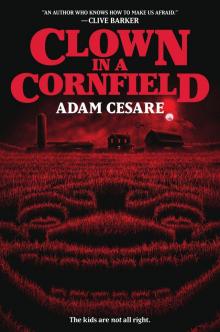 Clown in a Cornfield
Clown in a Cornfield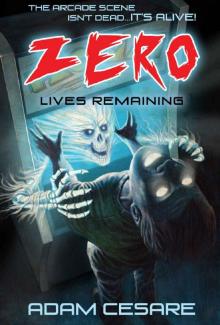 Zero Lives Remaining
Zero Lives Remaining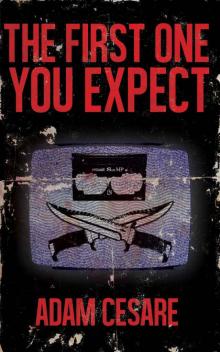 The First One You Expect
The First One You Expect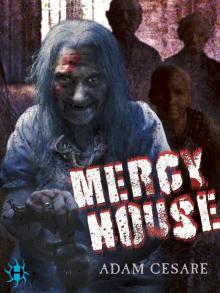 Mercy House
Mercy House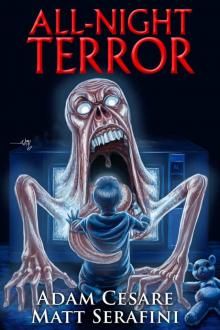 All-Night Terror
All-Night Terror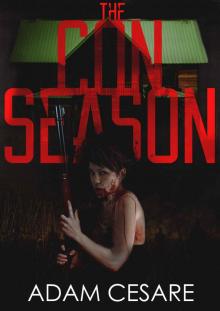 The Con Season: A Novel of Survival Horror
The Con Season: A Novel of Survival Horror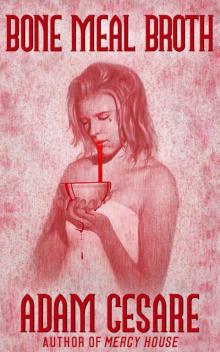 Bone Meal Broth
Bone Meal Broth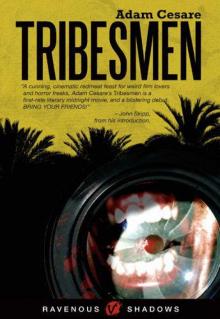 Tribesmen
Tribesmen